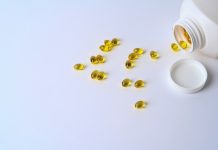
In a study from the University of Reading, scientists found examined the impact of high doses of Vitamin B6 on young adults.
They found that they reported feeling less anxious and depressed after taking the supplements every day for a month.
The study provides valuable evidence to support the use of supplements thought to modify levels of activity in the brain for preventing or treating mood disorders.
According to the team, the functioning of the brain relies on a delicate balance between the excitatory neurons that carry information around and inhibitory ones, which prevent runaway activity.
Recent theories have connected mood disorders and some other neuropsychiatric conditions with a disturbance of this balance, often in the direction of raised levels of brain activity.
Vitamin B6 helps the body produce a specific chemical messenger that inhibits impulses in the brain, and this study links this calming effect with reduced anxiety among people.
Previous studies have produced evidence that multivitamins or marmite can reduce stress levels, but few studies have been carried out into which particular vitamins contained within them drive this effect.
In the study, the team focused on the potential role of Vitamins B6, which is known to increase the body’s production of GABA (Gamma-Aminobutyric Acid), a chemical that blocks impulses between nerve cells in the brain.
They tested more than 300 participants who were assigned either Vitamin B6 or B12 supplements far above the recommended daily intake (approximately 50 times the recommended daily allowance) or a placebo, and took one a day with food for a month.
The team showed that Vitamin B12 had little effect compared to placebo over the trial period, but Vitamin B6 made a strong difference.
Raised levels of GABA among people who had taken Vitamin B6 supplements were confirmed, supporting the hypothesis that B6 was responsible for the reduction in anxiety.
Subtle but harmless changes in visual performance were detected, consistent with controlled levels of brain activity.
The team says many foods, including tuna, chickpeas and many fruits and vegetables, contain Vitamin B6.
However, the high doses used in this study suggest that supplements would be necessary to have a positive effect on mood.
The team says further research is needed to identify other nutrition-based interventions that benefit mental well-being, allowing different dietary interventions to be combined in the future to provide greater results.
If you care about depression, please read studies that vegetarian diet may increase your depression risk, and Vitamin D could help reduce depression symptoms.
For more information about mental health, please see recent about new drugs for depression and anxiety disorders, and MIND diet may slow down brain aging by more than 7 years.
The study was conducted by Dr. David Field et al and published in Human Psychopharmacology: Clinical and Experimental.
Copyright © 2023 Knowridge Science Report. All rights reserved.



